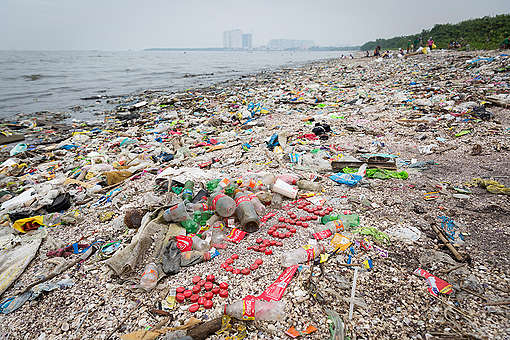Cali, Colombia – Over 350 businesses globally, including Lush, Ben & Jerry’s, and the New European Reuse Alliance, have signed an open letter urging governments to adopt an ambitious agreement that will cut plastic production and phase out single-use plastic.
“Champions of Change“, a joint initiative of Greenpeace International, Plastic Pollution Coalition, and the Break Free from Plastic movement, launched today ahead of the final Global Plastics Treaty negotiations in Busan, South Korea this November. Signatories are calling for the treaty to:
- Cap plastic production based on a historic baseline;
- Phase-out of single-use plastic, starting with sachets;
- Set ambitious reuse targets; and,
- Adopt a justice-centered approach to focus on the rights of communities affected by plastic pollution.
Business leaders issued an open letter on the sidelines of the 16th Convention on Biological Diversity in Cali, Colombia, where a ministerial meeting on the Global Plastics Treaty took place earlier in the week.
Cadi Pink, Global Sustainability Commercial Lead at Lush Cosmetics, said: “We are urgently encouraging all businesses to join us in supporting a strong Global Plastic Treaty. Given that the beauty industry is set to contribute to 120 billion units of packaging waste this year, with most of this being fossil fuel-derived plastic, the time to act is now. The planet needs a global target to reduce plastic production to address this crisis, which is harming people’s health, accelerating social injustice, and destroying biodiversity. Companies taking steps to reducing or eliminating the use of packaging should be a big part of this next chapter.”
Fernando Rodriguez-Mata, Director General at New European Reuse Alliance (New ERA), said: “Reuse systems play an essential role in reducing greenhouse gas emissions and material consumption. Capping plastic production and eliminating the most problematic single-use plastic items are two necessary steps in the right direction to scale up reuse solutions, but the setup of clear and robust financial incentives is also fundamental to turning the tide of our economies and making them truly circular and resource-efficient.”
The fifth Intergovernmental Negotiating Committee (INC5) meeting will happen in South Korea from November 25 to December 1, 2024, where governments are expected to agree on a Global Plastics Treaty. Businesses are urging negotiators to deliver an agreement with “binding global targets and timelines that respect planetary boundaries, human health and limit global warming to 1.5 degrees Celsius, and be applicable across sectors.”
Graham Forbes, Greenpeace USA’s Global Plastics Campaign Lead and Head of Delegation to the Global Plastics Treaty negotiations, said: “Forward-thinking brands and businesses worldwide recognize that plastic is a business risk and the inevitable shift away from plastic is a business opportunity. The world is moving forward and more businesses are stepping up. They are on board with the public’s demands to cut plastic production and end single-use plastic.”


